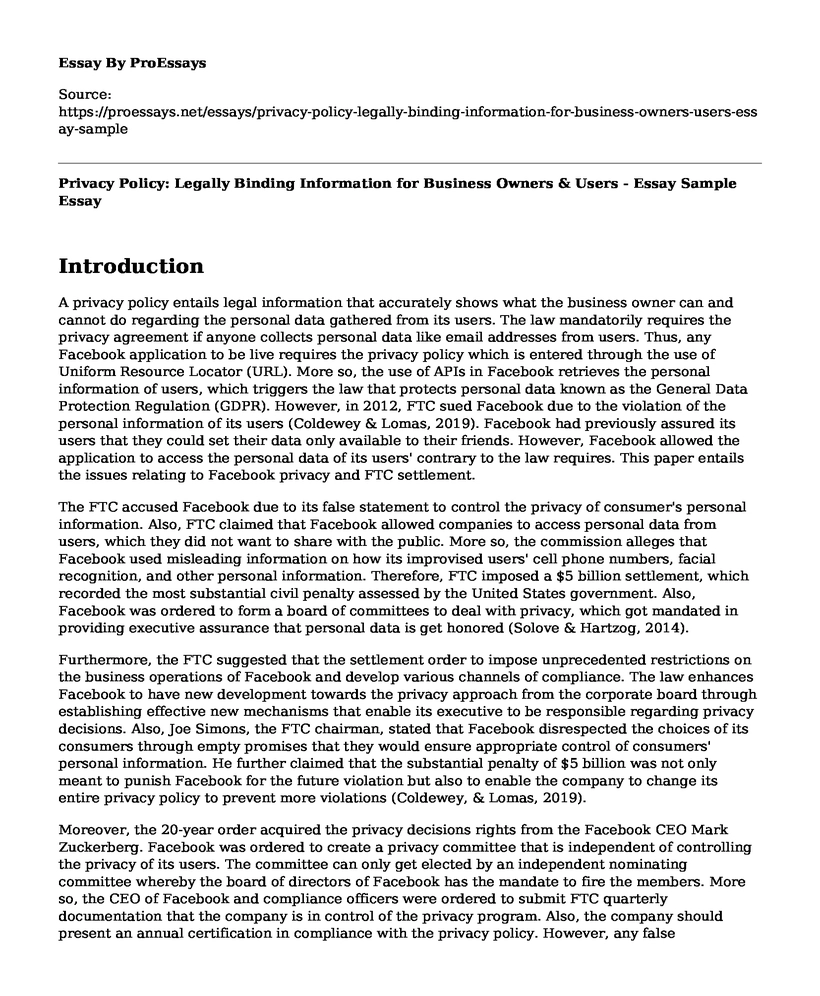Introduction
A privacy policy entails legal information that accurately shows what the business owner can and cannot do regarding the personal data gathered from its users. The law mandatorily requires the privacy agreement if anyone collects personal data like email addresses from users. Thus, any Facebook application to be live requires the privacy policy which is entered through the use of Uniform Resource Locator (URL). More so, the use of APIs in Facebook retrieves the personal information of users, which triggers the law that protects personal data known as the General Data Protection Regulation (GDPR). However, in 2012, FTC sued Facebook due to the violation of the personal information of its users (Coldewey & Lomas, 2019). Facebook had previously assured its users that they could set their data only available to their friends. However, Facebook allowed the application to access the personal data of its users' contrary to the law requires. This paper entails the issues relating to Facebook privacy and FTC settlement.
The FTC accused Facebook due to its false statement to control the privacy of consumer's personal information. Also, FTC claimed that Facebook allowed companies to access personal data from users, which they did not want to share with the public. More so, the commission alleges that Facebook used misleading information on how its improvised users' cell phone numbers, facial recognition, and other personal information. Therefore, FTC imposed a $5 billion settlement, which recorded the most substantial civil penalty assessed by the United States government. Also, Facebook was ordered to form a board of committees to deal with privacy, which got mandated in providing executive assurance that personal data is get honored (Solove & Hartzog, 2014).
Furthermore, the FTC suggested that the settlement order to impose unprecedented restrictions on the business operations of Facebook and develop various channels of compliance. The law enhances Facebook to have new development towards the privacy approach from the corporate board through establishing effective new mechanisms that enable its executive to be responsible regarding privacy decisions. Also, Joe Simons, the FTC chairman, stated that Facebook disrespected the choices of its consumers through empty promises that they would ensure appropriate control of consumers' personal information. He further claimed that the substantial penalty of $5 billion was not only meant to punish Facebook for the future violation but also to enable the company to change its entire privacy policy to prevent more violations (Coldewey, & Lomas, 2019).
Moreover, the 20-year order acquired the privacy decisions rights from the Facebook CEO Mark Zuckerberg. Facebook was ordered to create a privacy committee that is independent of controlling the privacy of its users. The committee can only get elected by an independent nominating committee whereby the board of directors of Facebook has the mandate to fire the members. More so, the CEO of Facebook and compliance officers were ordered to submit FTC quarterly documentation that the company is in control of the privacy program. Also, the company should present an annual certification in compliance with the privacy policy. However, any false documentation would subject the company to criminal penalties.
Conclusion
In conclusion, the order develops a new period of privacy transparency in the company. Also, it enhanced the creation of an independent committee that entails the board of directors to evaluate privacy decisions. Moreover, Facebook uses an independent third-party committee to oversee the effectiveness of the privacy policy. Therefore, the commission ensures the personal information of an individual is secure from any unauthorized party. Hence, website companies should adhere to the FTC order for appropriate privacy strategies of information.
References
Coldewey, D., & Lomas, N. (2019). Facebook settles with FTC: $5 billion and new privacy guarantees. Retrieved from https://techcrunch.com/2019/07/24/facebook-settles-with-ftc-5-billion-and-new-privacy-guarantees/
Solove, D. J., & Hartzog, W. (2014). The FTC and the modern common law of privacy. Colum. L. Rev., 114, 583. Retrieved from https://heinonline.org/hol-cgi-bin/get_pdf.cgi?handle=hein.journals/clr114§ion=19
Cite this page
Privacy Policy: Legally Binding Information for Business Owners & Users - Essay Sample. (2023, Mar 14). Retrieved from https://proessays.net/essays/privacy-policy-legally-binding-information-for-business-owners-users-essay-sample
If you are the original author of this essay and no longer wish to have it published on the ProEssays website, please click below to request its removal:
- Criminal Justice Discussion: Policing Styles
- Paper Example on Women's Rights are Human Rights
- Social Media and Gun Control Essay
- Should Homosexuals Be Allowed to Marry? Annotated Bibliography
- Essay Sample on Youth Violence: Impact on Criminal Justice and Public Health
- Essay Example on the Uncertainty of US Voting Rights: A Historical Perspective
- Crime Scene Investigation: Gather, Preserve, Analyze Evidence - Free Essay Example







